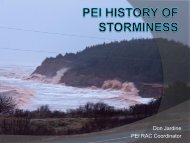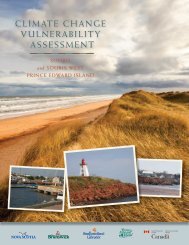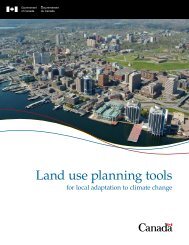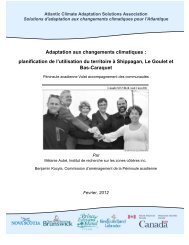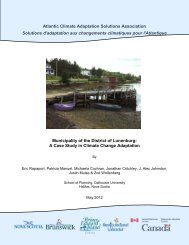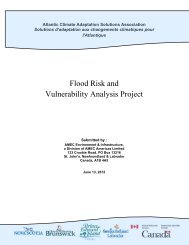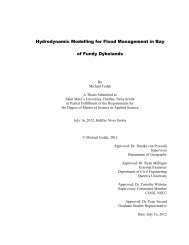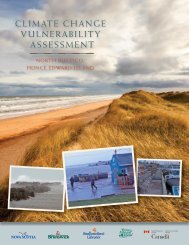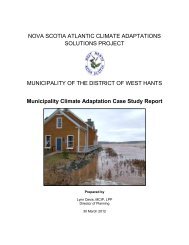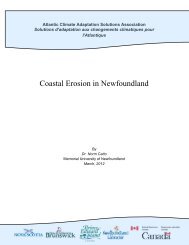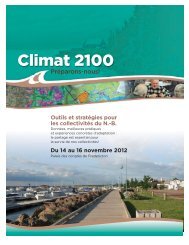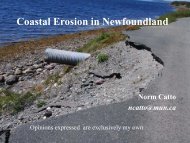Lunenburg Part 2 - Section 5 - Social Vulnerability - August 30.pdf
Lunenburg Part 2 - Section 5 - Social Vulnerability - August 30.pdf
Lunenburg Part 2 - Section 5 - Social Vulnerability - August 30.pdf
You also want an ePaper? Increase the reach of your titles
YUMPU automatically turns print PDFs into web optimized ePapers that Google loves.
costly damage if pipes freeze and burst. Power loss is an urgent concern for medically<br />
dependent persons who rely on devices such as respirators for survival. Emergency backup<br />
generators are a financial cost that socially vulnerable people may not be able to afford.<br />
The Tancook Islands are isolated, accessible only by ferry; only a small number of residents are<br />
present year-round. Consultees noted that ferry infrastructure is threatened by erosion around<br />
the ferry docks. Riisser’s Beach has no cellular phone service or payphones; although<br />
authorities evacuate the campground if a severe storm is anticipated, campers caught in<br />
unexpected severe weather could be unable to contact emergency services.<br />
Overall, many consultees indicated that access problems and damage to infrastructure are<br />
increasing in frequency, and the costs of accessing remote areas and providing comprehensive<br />
emergency service rise continually. Damage to infrastructure is costly to repair, and a significant<br />
burden for a municipality with limited resources, particularly if damage is recurring. Some argued<br />
that municipalities shoulder an unfair proportion of infrastructure maintenance costs. Due to<br />
budget constraints, the Municipality currently does not perform proactive maintenance of<br />
infrastructure, instead allowing facilities and equipment to function as long as possible, only<br />
performing repairs when a component has broken.<br />
Consultees identified a number of places of employment in locations with increased risk of storm<br />
damage or inundation, such as LaHave Seafoods, the High Liner Foods fish plant, the LaHave<br />
Bakery, boatworks in <strong>Lunenburg</strong> and Mahone Bay, and numerous active fishing wharves.<br />
Damage to these locations could cause loss of employment and private property, resulting in<br />
new or increased social vulnerability.<br />
Constraints to Risk Prevention<br />
Consultees demonstrated abundant knowledge about risk and probability of coastal flooding.<br />
However, the ability of the Municipality to undertake preventative measures is severely limited by<br />
the fact that the majority of the District, including much of the coastline, is unplanned, with no<br />
land use planning controls. Consultees explained that a plebiscite with 66% of voters in support<br />
of planning would be required to institute land use planning; although there is an additional<br />
clause that would allow Council to institute planning, councilors and staff both felt that this would<br />
be unlikely to occur except in an extreme situation, such as an imminent threat to the area’s<br />
supply of drinking water.<br />
Consultees noted that in those areas where secondary plans do exist, planning was instituted in<br />
reaction to a proposed development that residents objected to - such as an asphalt plant in the<br />
Blockhouse area, and a gun range near Riverport –rather than as a means to plan proactively.<br />
Consultees had mixed perspectives about local interest in planning: some suggested that there<br />
are no local champions for planning or climate change adaptation while others identified<br />
significant community support for coastal planning, and speculated that this could be the majority<br />
view. Several communities have expressed interest in coastal planning; examples include Petite<br />
Riviere and the entire Broad Cove to LaHave area, where over eighty residents attended an<br />
informational workshop; and Kingsburg, where the Kingsburg Coastal Conservancy includes a<br />
large proportion of residents.<br />
All consultees agreed that many long-time residents have a strong sense of ownership of their<br />
land, and resist interference in their private property rights. However, they may also object to<br />
new coastal development that blocks their view and access to the water. New residents may be<br />
more supportive of land use planning; many have previously lived in areas with restrictions<br />
imposed by planning controls, or have witnessed the types of problems that can occur without<br />
planning. Consultees agreed that while local people are generally knowledgeable about weather<br />
64



